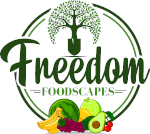Permaculture vs. Farming Benefits and How Does Horticulture Fit In?
Benefits of Permaculture
- Sustainability: Permaculture is designed to be a sustainable and regenerative system that works with nature, rather than against it. It reduces the need for synthetic inputs like pesticides and fertilizers, and promotes soil health and biodiversity.
- Resilience: Permaculture systems are often more resilient to changes in climate and weather patterns, as they are designed to mimic natural ecosystems that have adapted to changing conditions over time.
- Community-building: Permaculture emphasizes the importance of community and sharing resources. It often involves collaborative work and knowledge-sharing among growers and community members.
- Health: Permaculture emphasizes the use of organic and natural methods for growing food, which can lead to healthier fruits and vegetables that are free of harmful chemicals.
Benefits of Current Agricultural Farming (debatable)
- Productivity: Farming can be more productive than permaculture, as it often involves the use of machinery and synthetic inputs that can increase crop yields. (This is highly debatable as permaculture design has been shown to have increased yields 5:1 in comparison to monocrop farming acre over acre)
- Profitability: Farming is often done for commercial purposes, and can be more profitable than permaculture for those who are able to sell their crops at market. (Again, debatable as there are costs associated in farming with the harvest for large scale equipment, chemical fertilizers, etc., where people using permaculture can simply set up a U-pick system for local clients to get their groceries… LOCAL IS ALWAYS BEST!)
- Scale: Farming can be done on a larger scale than permaculture, which may be more suitable for meeting the needs of large populations. (You guessed it, again highly debatable! Looking at all of the open property and lawnspace, there are not needs for large swaths of land to grow wheat, corn and soy that are the staple crops of US farmers and rarely are used to actually feed people instead of for other commercial applications)
- Flexibility: Farming can be more adaptable to changing market demands and consumer preferences, as farmers are able to adjust their crops and practices to meet demand. (Again, false! When you have a massively diverse system set up all over the world, demands can always be met by multiple permaculture “farm” locations that are far more sustainable and less prone to market changes)
Ultimately, the benefits of permaculture vs. farming depend on one’s goals and values. Permaculture may be more suitable for those who prioritize sustainability and community-building, while farming may be more suitable for those who prioritize productivity and profitability.
Where Does Horticulture Fit In?
Horticulture is focused on the cultivation of plants for food or other purposes, and it uses more specialized methods for maximizing crop yields and using artificial means to control growth.
From our perspective, this is somewhat of an in-between state. Variations in plant species typically come from the horticulture group and can be beneficial, however, there are concerns over the viability of many of the varieties as intentions don’t always yield a better plant than what was originally heirloom varieties. This is typically where the GMO conversation steps in along with utilization of artificial chemicals. We prefer the naturally occurring varieties instead of those created in a lab. Nature has always shown us the best way to grow foods. Through long-term observation and allowing the plants to “evolve” themselves, nature always finds a way.
Are you ready to start planning your permaculture design?
Why Freedom Foodscapes?
Passion: Freedom Foodscapes is passionate about permaculture and believe in the principles of sustainability and regenerative design. Our team is knowledgeable about the latest techniques and technologies in permaculture design and implementation.
Personalized Approach: We understand that each project is unique and requires a personalized approach. We work closely with our clients to understand their vision, needs and budget. We will develop a customized solution that will meet your specific requirements.
Custom Design Service: We offer full design services using food producing plants and other organic elements through our partnership with Food Forest Abundance (FFA). Each design is based on your zone, topography, soil fertility and space. Beauty, functionality, and abundance are incorporated into your design based on your personal preferences. Request a design consultation.
Trained Permaculture Installation: Designing and implementing a permaculture installation is a complex and specialized process that requires knowledge and skills. Freedom Foodscapes specializes in permaculture design and can work with you from the planning stage through implementation and maintenance to optimize the performance of your food forest. We can ensure that your design and implementation maximizes its sustainability and productivity.
